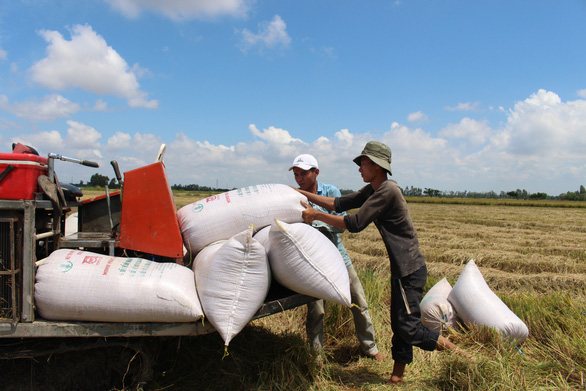 Economy
Economy


|
| Kicker: Effective and timely measures this year saved the winter-spring crop. Photo courtesy of tuoitre.vn |
HCM CITY — The Mekong Delta provinces of Kiên Giang and Long An have asked the Government to reconsider its temporary ban on rice exports, saying it would discourage farmers from growing the autumn-winter crop this year.
Speaking at an online conference held to review the winter-spring crop by the Ministry of Agriculture and Rural Development (MARD), vice chairman of the Kiên Giang People’s Committee, Mai Anh Nhịn, warned that the suspension of exports would significantly impact rice production.
Despite the saltwater intrusion in rivers, effective and timely measures this year saved the winter-spring crop, he said.
Kiên Giang Province has harvested 93 per cent of its rice crop with the average yield of 7.24 tonnes per hectare, an increase of 0.3 tonnes from last year. The output so far is 1.924 million tonnes, 104,712 tonnes higher than a year ago.
The upcoming summer-autumn crop is expected to be grown on 284,000ha, he said.
After the Government’s decision to suspend rice exports, prices have decreased by VNĐ300-500 per kilogramme, and the low prices could affect farmers’ motivation to grow the summer-autumn crop, he warned, urging a lifting of the ban.
Nguyễn Thanh Truyền, director of the Long An Province Department of Agriculture and Rural Development, said many businesses are worried about the export suspension.
The province has 300,000 tonnes of the grain in stock and 24 export firms.
He sought permission to fulfil export contracts signed before March 24, warning there would be severe losses otherwise.
Deputy Minister of Agriculture and Rural Development Lê Quốc Doanh said the delta has this year won an important victory in overcoming the effects of saltwater intrusion and drought.
The sowing area for the 2019-20 winter-spring crop in the southern region was over 1.6 million hectares, and the output is estimated at over 11 million tonnes.
The agriculture ministry stressed the importance of adjusting the farming schedule to achieve productivity, yield and production targets and secure export opportunities.
Food security must be prioritised to prepare for potential natural disasters and unfortunate domestic and global events, it added. — VNS




